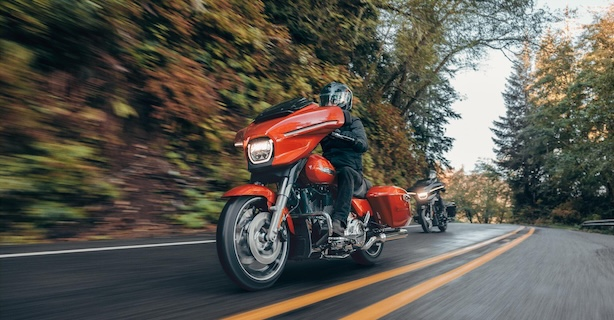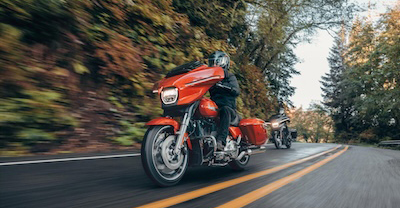If you’re excited about hitting the road on your new motorcycle, there’s one thing you need to think about before taking off. Yes, we’re talking about insurance!
You might be wondering how quickly you need to sort it out and what the rules are around securing a motorcycle insurance policy.
Luckily, we’ve got you covered. Below, we’ll take you through everything you need to know about getting insurance after buying a motorcycle, along with some tips to ensure you’re covered.
DO YOU NEED MOTORCYCLE INSURANCE RIGHT AWAY?
The short answer is: yes, nearly all states require you to have motorcycle insurance before you can legally ride.
You also won’t be able to register your bike and get a license plate without it. However, the exact timing can vary slightly depending on your situation and location.
Most states require that you carry at least the minimum liability insurance to cover injuries or property damage if you’re involved in an accident. This means you need coverage to protect yourself, meet legal requirements, and ensure financial responsibility toward others on the road.
So, while you may be able to buy a motorcycle without insurance, riding it without proof of insurance is almost certainly against the law.
IS THERE A GRACE PERIOD FOR MOTORCYCLE INSURANCE?
Grace periods for motorcycle insurance can sometimes apply, but they’re not a universal rule, so it’s worth confirming with your insurance agent.
Some insurers allow existing customers a grace period to add a newly purchased motorcycle to their current policy, but this typically applies only to those who already have an active automobile or motorcycle insurance policy in place.
In most cases, this period lasts between 7 to 30 days.
Remember, though, that grace periods vary, and many states still require immediate insurance coverage for newly purchased bikes.
If you don’t currently have any form of vehicle insurance, it’s essential to get your motorcycle insured before you start riding. Skipping insurance can lead to steep fines, penalties, and even a suspended license if you’re caught without it.
HOW MUCH COVERAGE DO YOU NEED?
You might be wondering just how much coverage you really need. The answer depends on your location, your bike, and your financial situation.
Most states mandate basic liability coverage, which includes:
Bodily Injury – May cover medical costs for injuries you cause to others in an accident.
Property Damage – Can pay for damage to someone else’s property if you’re at fault.
Beyond these basic requirements, some motorcycle owners consider additional coverage options for extra protection.
Let’s break down a few to see which ones might be a good fit:
Collision Coverage – Can help cover the cost of repairs to your motorcycle if you’re in an accident, regardless of fault.
Comprehensive Coverage – May protect against non-accident-related damage, like theft, vandalism, or natural disasters.
Uninsured/Underinsured Motorist Coverage – Can protect you in the event you’re involved in an incident with someone without sufficient insurance.
Medical Payments or Personal Injury Protection (PIP) – May cover medical expenses for you and sometimes your passengers, depending on the policy.
While these options may increase the overall cost of insurance, the increased protection can be well worth the peace of mind, especially if your motorcycle is a significant investment.
DOES IT MATTER WHERE YOU’RE BUYING THE MOTORCYCLE FROM?
Whether you’re buying from a dealership or a private seller can impact when you need insurance. Dealerships may ask for proof of motorcycle insurance before you leave with the bike. Private sellers, on the other hand, generally don’t require this. However, regardless of the seller, you need insurance before you legally hit the open road.
CAN YOU TEST RIDE WITHOUT INSURANCE?
When it comes to test riding a motorcycle before buying, it’s crucial to understand the insurance implications. Dealerships generally have insurance that covers test rides, so you're protected while you assess the bike.
However, if you’re buying from a private seller, there may be no insurance coverage for a test ride. In this case, you’ll want to check your own motorcycle insurance policy to see if it extends coverage to a borrowed or test-driven motorcycle.
Riding without any coverage, even just for a test ride, can leave you vulnerable to personal liability if an accident happens.
FINANCING YOUR MOTORCYCLE? HERE’S WHAT TO KNOW
Financing a motorcycle adds an extra layer to your insurance requirements. When you finance, the lender technically owns the bike until it’s fully paid off.
Because of this, most lenders will require you to carry comprehensive and collision insurance in addition to the state-required liability coverage. This protects their investment in case of an accident, theft, or other issues that could damage or total the bike.
If you’re buying your motorcycle outright, comprehensive and collision coverage is optional. You can choose the amount of coverage that suits your needs and budget. Just remember, though, that skipping these protections could leave you with a hefty bill if something happens to your ride.
ADDITIONAL TIPS FOR GETTING INSURED QUICKLY
If you’re ready to get your motorcycle insured but are new to the process, here are a few tips to help speed things up:
Compare quotes online - Many insurers offer online quote tools, so you can compare options in minutes.
Bundle with existing motorcycle policies - If you already have a motorcycle insured, check with your current provider. Bundling your policies can often lead to discounts.
Consider your deductible - A higher deductible usually means a lower premium. If you’re confident you can cover a higher deductible in the event of a claim, it could save you money on monthly costs.
Ask about discounts - Many insurance companies offer discounts for things like motorcycle safety courses, low mileage, or if you store your bike in a secure location.
ENJOY THE RIDE WITH PEACE OF MIND
Taking the time to find the right insurance policy may seem like a bit of a chore, but it’s worth it in the end. With the proper coverage, you’re free to enjoy the open road with confidence, knowing you’ve got a safety net in place.
Related Reading
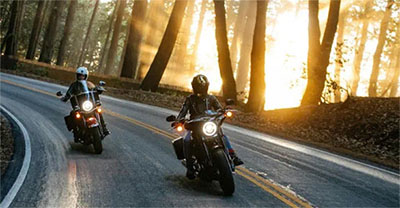
Motorcycle insurance premiums are based on many factors. Some choices are in your control, but some are legal requirements. Here’s what you need to know!
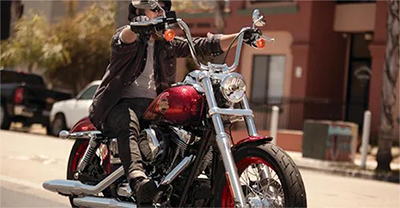
Many things affect the average cost of motorcycle insurance coverage. Age may be a big factor. Discover what premium you can expect as you age!

Discover the risks and potential consequences of letting your motorcycle insurance lapse. Contact Harley-Davidson® Insurance to get a quote today!
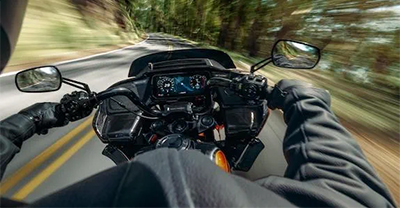
While it is impossible to stop depreciation entirely, understanding how it works and what factors affect it can help preserve the value of your motorcycle.

